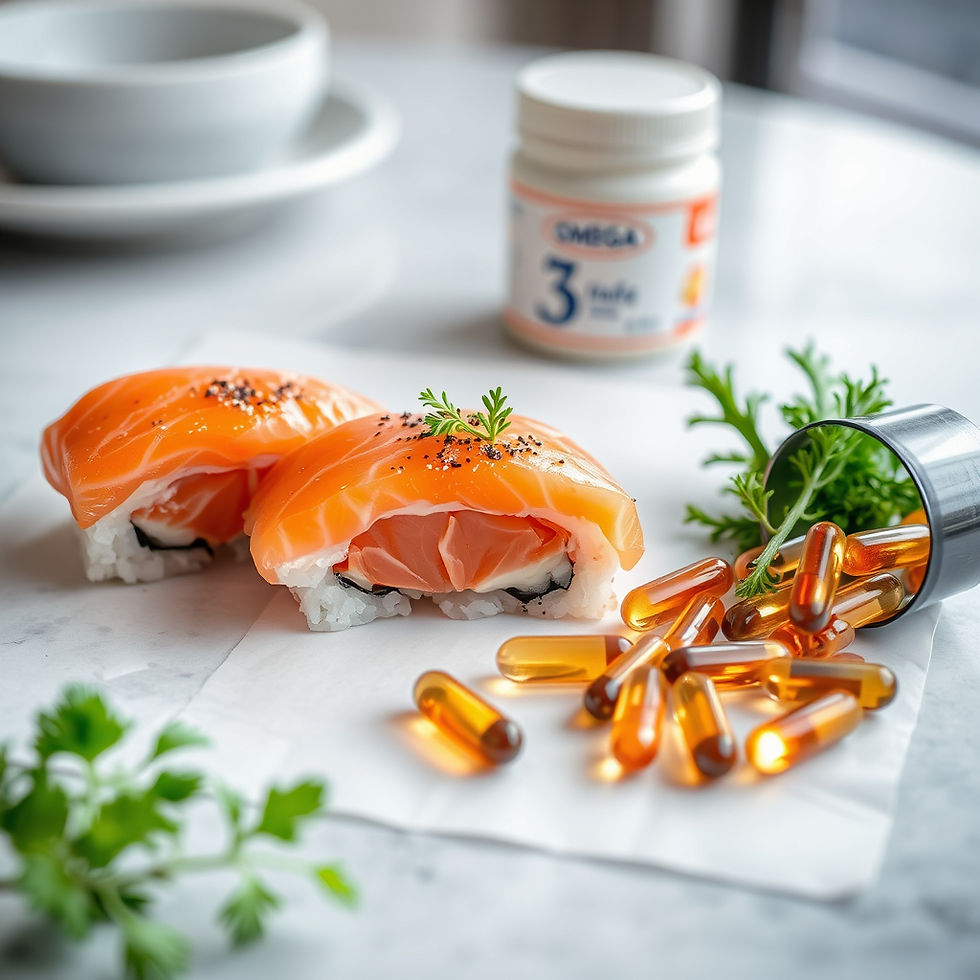🐟 Omega-3s: The Most Powerful Nutrient You’re Probably Not Getting Enough Of
- Chris
- Jul 15, 2025
- 7 min read
Updated: Jul 28, 2025

Created by Christopher Caffrey, ACNP, PMHNP
January 24th 2025, revised July 16th 2025
Key Takeaways:
1. Omega-3s Fuel Your Brain and Body Your brain is 60% fat, and omega-3s—especially DHA—are crucial for memory, mood, focus, and emotional health. They also support heart health, joint function, vision, and skin integrity.
2. They’re Nature’s Anti-Inflammatory Superstars Omega-3s help reduce chronic inflammation—the underlying root of many diseases including heart disease, autoimmune conditions, and depression.
3. You’re Probably Not Getting Enough Most people don’t consume enough omega-3s, especially if they don’t eat fatty fish. ALA from seeds is limited—your body needs EPA and DHA from seafood or supplements.
4. Supplements Help—But Quality and Balance Matter If you’re not eating fish 2–3 times a week, a high-quality omega-3 supplement can help. Also, reduce omega-6s from processed foods to keep your omega balance in check.
5. You Can Use Pre-Tax Dollars to Pay for Them Become a patient of Flexup Wellness and omega-3s (and much more) can become FSA/HSA eligible, helping you save around 30% on something your body truly needs.
Let’s take a moment to focus on what really counts—your health and what fuels it. And not in a vague, “go eat your veggies” kind of way. I’m talking about a single nutrient group that could impact everything from your heart and brain to your skin and sleep.
Enter: omega-3 fatty acids—the unsung heroes of the nutritional world.
You’ve probably seen them hyped in fish oil commercials or plastered across supplement bottles. But are omega-3s just another health fad? Or do they genuinely offer life-changing benefits?
Spoiler alert: They’re the real deal. And if you’re not paying attention to your omega-3 intake, it’s like driving a Ferrari with bald tires—powerful engine, but poor grip on the road.
🧬 What Are Omega-3s, Anyway?
Let’s start with the basics.
Omega-3s are a type of polyunsaturated fat, which might sound like something your cardiologist warned you about, but don’t worry—these are the good guys. The kind of fat your body loves. The kind your cells and brain literally need to function.
Important: Your body can’t make omega-3s on its own. They’re called essential fatty acids because you must get them from your diet.
There are three main types of omega-3 fatty acids you should know, and they’re not all created equal:
ALA (Alpha-linolenic acid): This is the plant-based omega-3, found in flaxseeds, chia seeds, hemp seeds, walnuts, and some vegetable oils. ALA is great for overall health, and it has antioxidant properties. But here’s the catch—it’s like the raw material, not the finished product. Your body has to convert ALA into the two heavy hitters: EPA and DHA. And that conversion process? It’s about as efficient as trying to turn a tricycle into a Tesla—technically possible, but you’re not going very far or very fast.
EPA (Eicosapentaenoic acid): This omega-3 is a superstar when it comes to taming inflammation. Think of EPA as your body’s fire extinguisher. It helps calm down chronic inflammation, which is at the root of many modern diseases like heart disease, arthritis, and even depression. You’ll mostly find EPA in fatty fish like salmon, sardines, anchovies, and mackerel.
DHA (Docosahexaenoic acid): If EPA is the fire extinguisher, DHA is the building block. It’s critical for your brain and eyes. In fact, DHA makes up a huge part of the fat in your brain—so when we say “feed your brain,” this is what we mean. DHA is also abundant in fatty fish, and it’s especially important for pregnant women and growing kids because it helps build healthy brains and nervous systems.
Here’s the bottom line: ALA is good, but EPA and DHA are where the real magic happens. If you eat a mostly plant-based diet, you may not be getting enough of the direct sources of EPA and DHA, which is why many people choose an algae-based omega-3 supplement—nature’s vegan-friendly shortcut straight to the good stuff.
Medical Benefits of Omega 3's:
❤️ 1. Heart Health: Your Internal Engine
Heart disease is still the #1 cause of death globally. That’s not fear-mongering—it’s a reality check. But here’s the empowering part: omega-3s are one of the most researched nutrients when it comes to heart protection.
Studies show omega-3s can:
Lower blood pressure
Reduce triglycerides (those pesky fats in your blood that clog up arteries)
Prevent heart rhythm disorders
Protect against heart attack and stroke
Think of omega-3s as anti-inflammatory motor oil for your heart—they help it beat smoothly and stay strong under pressure.
One large review even found that people who consumed more omega-3s had significantly lower risks of heart attacks and death from heart disease. That’s not hype. That’s data.
🧠 2. Brain Function: Fuel for Thought
Your brain is about 60% fat. That’s right. Fat. So if you’ve ever been told fat is bad, think again. Especially when it comes to omega-3s.
DHA in particular is a major structural component of the brain. Without it, your cognitive function starts to run like an old Windows '95 computer—lagging, glitchy, and prone to crashing.
Omega-3s help:
Boost memory and focus
Support learning and neuroplasticity
Protect against age-related decline
Reduce symptoms of depression and anxiety
In fact, several studies suggest that low omega-3 levels are associated with an increased risk of depression. It’s like your brain is missing a key ingredient to make feel-good neurotransmitters like serotonin and dopamine.
So if you’re struggling with mood swings or brain fog, omega-3s might just be your missing puzzle piece.
🔥 3. Inflammation: Calming the Fire Within
Chronic inflammation is the root of nearly every chronic disease—heart disease, cancer, diabetes, Alzheimer’s, arthritis… you name it.
Imagine your body as a house, and inflammation as a slow-burning electrical fire in the walls. You don’t see it at first, but over time, it causes damage that’s hard to undo.
Omega-3s are like the fire extinguishers. They don’t just mask the flames—they help douse the source.
In clinical trials, omega-3s have been shown to:
Lower inflammatory markers like CRP
Improve outcomes in autoimmune diseases like rheumatoid arthritis and lupus
Soothe symptoms in conditions like asthma and eczema
Want to future-proof your body against disease? Start by cooling the internal fire.
👁 4. Eye Health: Vision You Can Count On
DHA isn’t just good for your brain—it’s also a major component of your retinas. That’s right, your ability to see clearly depends on adequate omega-3 intake.
Low levels of DHA have been linked to:
Blurred vision
Dry eyes
Increased risk of macular degeneration, the leading cause of blindness in older adults
Think of DHA as eye insurance—it protects the delicate tissues that let you see the world.
🤰 5. Pregnancy & Development: Building Baby’s Brain
If you’re pregnant (or planning to be), omega-3s are as essential as prenatal vitamins. In fact, I’d argue they should be non-negotiable.
During pregnancy, omega-3s support:
Fetal brain and eye development
Lower risk of preterm birth
Potential protection against developmental delays
And yes, studies show children whose mothers consumed adequate omega-3s during pregnancy performed better on cognitive and behavioral tests later in life.
It’s like giving your baby’s brain a supercharged head start.
🌿 6. Skin Health: Beauty from the Inside Out
Your skin isn’t just a beauty metric—it’s a reflection of your internal health. Omega-3s support skin hydration, reduce inflammation, and help regulate oil production.
They’ve been shown to improve:
Eczema
Psoriasis
Acne
Premature aging and dryness
So before you spend another $80 on a fancy serum, maybe check or supplement for your omega-3 levels. Glowing skin might be a forkful of salmon away.
⚖️ 7. Weight & Metabolism: Fat That Helps Burn Fat
It sounds counterintuitive, but yes—eating healthy fat can help you lose weight.
Omega-3s may:
Boost metabolism
Improve insulin sensitivity
Increase leptin, the hormone that tells your brain you're full
In other words, omega-3s help your body burn more calories at rest and prevent overeating. They support healthy hormone function and reduce fat-storing inflammation.
So don’t fear the fat—embrace the smart fats.
🦴 8. Bones & Joints: Strength from the Inside
If you think bone health is just about calcium and vitamin D, think again.
Omega-3s also play a key role in:
Improving bone mineral density
Reducing joint pain
Supporting flexibility and mobility
One study found that omega-3s helped increase calcium absorption, leading to stronger bones and fewer fractures—especially in postmenopausal women.
If your joints feel creaky, consider omega-3s your internal WD-40.
😴 9. Sleep: Deeper Rest, Naturally
Sleep isn’t a luxury—it’s a biological necessity. And omega-3s can help improve both the quality and duration of your rest.
DHA plays a role in melatonin production, the hormone that regulates your sleep-wake cycle.
Studies show higher DHA levels are linked to:
Longer sleep duration
Fewer nighttime awakenings
Reduced risk of sleep apnea
So if you’re tossing and turning, maybe don’t reach for the sleep meds just yet. Try adding some wild-caught salmon to your dinner plate first.
🧠 10. Mental Health Disorders: A Ray of Hope
From ADHD to bipolar disorder to schizophrenia, omega-3s have shown potential as supportive treatments.
Research shows omega-3s can:
Reduce mood swings in bipolar disorder
Improve focus and behavior in children with ADHD
Lower relapse rates in schizophrenia
While they’re not replacements for psychiatric care, they’re powerful adjuncts—especially since many of these conditions are tied to inflammation, which omega-3s help regulate.
As a psychiatric provider, this is often one of the first recommendations I make to patients struggling with mood, focus, or emotional regulation.
🧂 How to Get More Omega-3s (Without Getting Overwhelmed)
Let’s get practical.
🐟 Eat Fatty Fish Twice a Week
Salmon, sardines, anchovies, mackerel, and herring are all packed with EPA and DHA. Wild-caught is best.
🌱 Add Seeds & Nuts
Flaxseeds, chia seeds, and walnuts are great plant-based sources of ALA. Just remember, conversion to EPA/DHA is limited.
💊 Consider a Supplement
If you don’t eat fish, a high-quality fish oil or algal oil supplement can fill the gap. Look for brands tested for purity and heavy metals.
⚖️ Balance Omega-6 Intake
Most Western diets are too high in omega-6s (found in processed vegetable oils), which can block omega-3 absorption. Aim for a better balance.
💡 Pro Tip: Use Your FSA/HSA to Cover Omega-3 Supplements
Did you know omega-3s can be FSA/HSA eligible when recommended by a licensed provider?
With a quick 2-minute online evaluation through Flexup Wellness, you become a patient and you can get a legally compliant Letter of Medical Necessity that makes your omega-3s, organic fish/food, gym memberships, personal traning sessions, and much more reimbursable with pre-tax dollars...saving an average of 30%. Imagine legally saving 30% off organic salmon for your family.
It’s a health win + a financial win.
🧠 Final Thoughts: Omega-3s Are the Real Deal
Omega-3s aren’t hype. They’re foundational.
They nourish your brain, calm inflammation, protect your heart, support your sleep, balance your mood, and fuel your body from the inside out.
This isn’t just about taking a supplement. It’s about building a life—one choice at a time—that aligns with how your body actually works.
So next time you’re thinking about upgrading your health, skip the fads.Go back to the basics.Start with omega-3s.
Your body—and your future self—will thank you.




I had no idea that omega 3 had all of these benefits. I am looking forward to adding this supplement to my diet. Great read!
I needed to read this. Omega 3 is a must for me and will get more of it in my diet now , and will get supplements too… I appreciate the education on it , especially how it decreases inflammation and cancer risks. By doing the health assessment, I ll be able to use the supplements towards the tax saving hsa